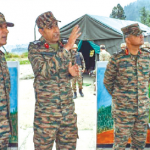STRIKING THE BALANCE
There is a growing perception in some circles that the National Education Policy (NEP) 2020 sidelines summative assessments in favour of school-based ones. This misconception, like many others, needs to be set straight to preserve the integrity of our assessment system. Under the heading “Transforming Assessment for Student Development”, NEP-2020 states that the primary purpose of assessment will indeed be for learning; it will help the teacher and student, and the entire schooling system, continuously revise teaching-learning processes to optimize learning and development for all students.
In this regard, one of its most celebrated features is the emphasis on formative, competency-based, and school-based assessment (SBA). This has led to a healthy movement towards holistic evaluation. Shifting from rote memory-based assessment to competency-based assessment, as envisaged in the National Education Policy (NEP) 2020, is not an option but a necessity, because the future of education lies not in how much a learner can recall, but in how effectively they can apply knowledge, think critically, solve problems, and demonstrate real-life skills.
However, in the enthusiasm to break from the old, a new and potentially dangerous idea is taking root — that summative or external examinations are obsolete and should be entirely discarded. This idea, though often well-meaning, misreads the spirit of NEP 2020. The policy does not call for the elimination of summative assessments, but rather their reform. It envisions an assessment system that is both child-centric and competency-based.
Formative School-Based Assessments help in optimising learning but at the same time they can play a pivotal role in complementing final summative assessments. Let us dwell into both the types of assessments and try to conclude whether they are complementary to each other or contrasting.
The Strength of School-Based Assessment
Regarding SBA, the policy says: The aim of assessment in the culture of our schooling system will shift from one that is summative and primarily tests rote memorization skills to one that is more regular and formative, is more competency-based, promotes learning and development for our students, and tests higher-order skills, such as analysis, critical thinking, and conceptual clarity.
Besides pen-paper tests, school-based assessments—also called formative assessments—involve a variety of techniques such as project work, oral presentations, peer assessment, observations, assignments, and surveys. These techniques, when used along with tools such as rubrics, checklists, portfolios, anecdotal records, and rating scales, help capture a child’s learning journey in a more qualitative and continuous manner.
Unlike final exams, these formative assessments are ongoing and low-stakes, helping teachers regularly check students’ understanding and adjust their teaching accordingly. Being integrated with the teaching-learning process, there remains sufficient scope for reteaching and optimising learning.
The NEP’s stress on assessment for learning over assessment of learning places SBA at the heart of pedagogy. This is a welcome and much-needed shift.
The Case for Summative Examinations
It is no coincidence that NEP explicitly recommends school examinations at Grades 3, 5, and 8, to be conducted not by schools but by an appropriate authority. This highlights the continued relevance of summative, external assessments, even in foundational stages. The policy says:
“…….all students will take school examinations in Grades 3, 5, and 8 which will be conducted by the appropriate authority. These examinations would test achievement of basic learning outcomes, through assessment of core concepts and knowledge from the national and local curricula, along with relevant higher-order skills and application of knowledge in real-life situations, rather than rote memorization.” (Para 4.40)
It will not be irrelevant to say that external examinations, especially at the end of a stage, are expected to play a vital role in strengthening the education system. They ensure uniform and fair assessment standards across schools and provide system-level data to evaluate and improve teaching-learning processes. These assessments hold schools accountable for student learning without placing undue pressure on the child. By preventing grade inflation and ensuring objectivity, they maintain the credibility of evaluation.
Moreover, such assessments build trust among parents and stakeholders by ensuring transparency and fairness. They support evidence-based planning and reforms in pedagogy, teacher training, and resource allocation. Most importantly, they promote healthy competition among schools to consistently improve learning outcomes and uphold academic standards.Since all schools—government and private—aim to increase enrollment, their results in external assessments reflect the quality of education and guide parents in choosing the right school for their children.
Thus, while the NEP rightly encourages a shift from rote memorisation to competency-based formative assessments, it equally emphasises the need for formal, structured competency-based summative assessments. It clearly recommends external examinations at key stages like Grades 3, 5, and 8, and also reaffirms the continuation of Board examinations for classes 10 and 12—ensuring a balanced and credible assessment framework across all stages of schooling.
Conclusion
As such, the case stands that formative assessments as SBA are integral, but at the same time, summative assessments are inevitable. If schools are given unchecked autonomy to conduct and evaluate their own assessments, how can we ensure objectivity, benchmarking, and a common standard of learning? The risk of dilution—whether in evaluating student achievement or ensuring syllabus completion cannot be underscored.
When schools are aware that assessments will be conducted by an external and independent authority, it brings a sense of responsibility, seriousness, and alignment with the expected learning outcomes. It becomes a system check—not to police schools, but to uplift the standard of education uniformly across regions.
To do away with what NEP calls the Learning Crisis, and to enhance learning standards, reinforce institutional accountability, and foster continuous quality enhancement across the education system, it is imperative that appropriate external agencies and institutions (such as Boards, SCERTs and DIETs) frame robust mechanisms for conducting external examinations and revitalising the system holistically.
(Author is Teacher/Teacher Trainer. Email:[email protected])










